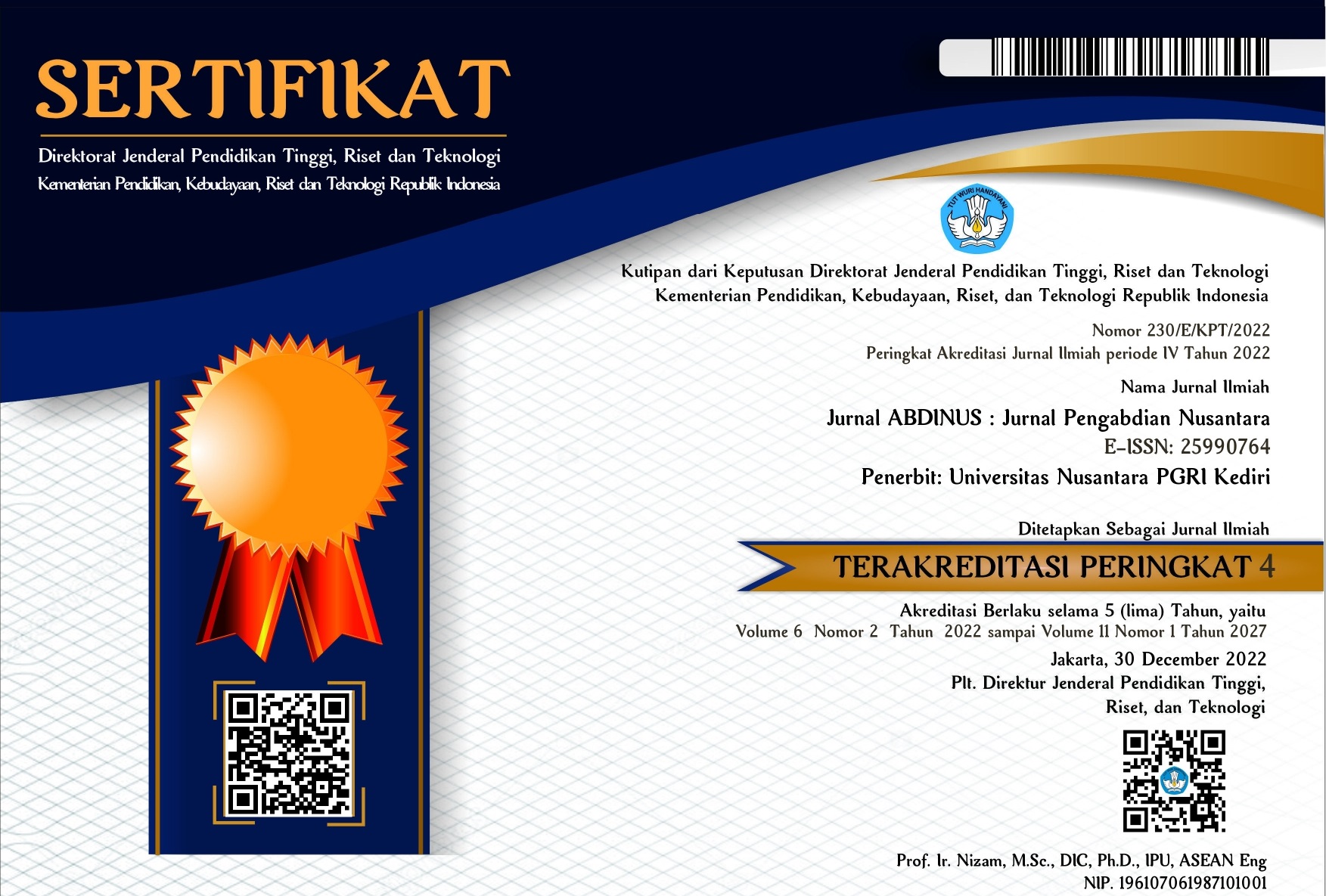Edukasi Covid-19 Pada Anak Usia Dini
DOI:
https://doi.org/10.29407/ja.v5i2.15790Keywords:
Health education, Covid-19, Early childhoodAbstract
Since the start of the learning year of this strange semester, all the learning processes have been taking place online because they are in a Covid-19 pandemic situation. During the 2019 coronavirus disease pandemic (COVID-19), which is currently occurring around the world. The boredom of children who are always active at home and very limited often causes them not to do the activities recommended by the government. The proposed solutions provide information about Covid-19 in early childhood by providing education for Covid-19 via an online zoom. The development of web-based evaluations of school health promotion programs has been shown to be effective and is not inferior to face-to-face. This activity lasts one hour from 07:30 to 08:30 WIB. There are still many who do not know about Covid-19, for example the Covid-19 stands, why children have to stay at home, why cannot children go to school. The questions they raised showed that they still do not understand Covid-19. After explaining that children could answer several questions, for example length of Covid-19, signs of Covid-19, what should children do now, why should they wash their hands, wear a mask and stand away from other people. They answer the questions well.
Downloads
References
Cohen, M. S., & Corey, L. (2020). Combination prevention for COVID-19. Science, 368(6491), 551. https://doi.org/10.1126/science.abc5798
Direktorat Jenderal Pencegahan dan Pengendalian Penyakit P2P, & Kemenkes RI. (2020). Pedoman Pencegahan dan Pengendalian Coronavirus Disease (COVID-19). (L. Aziza, A. Aqmarina, & M. Ihsan, Eds.) (Revisi ke). Jakarta: Kemenkes RI.
Eschenbeck, H., Lehner, L., Hofmann, H., Bauer, S., Becker, K., Diestelkamp, S., … Salize, H.-J. (2019). School-based mental health promotion in children and adolescents with StresSOS using online or face-to-face interventions: study protocol for a randomized controlled trial within the ProHEAD Consortium. Trials, 20, 1–12. https://doi.org/10.7892/boris.136049
Espigares-Tribo, G., & Ensenyat, A. (2020). Assessing an educational booklet for promotion of healthy lifestyles in sedentary adults with cardiometabolic risk factors. Patient Education and Counseling. https://doi.org/10.1016/j.pec.2020.06.012
IDAI. (2020). Anjuran Ikatan Dokter Anak Indonesia mengenai Aktivitas Anak di Luar Rumah Selama Masa Pandemi Covid-19.
Kammoun, R., & Masmoudi, K. (2020). Paediatric aspects of COVID-19: An update. Respiratory Medicine and Research. https://doi.org/10.1016/j.resmer.2020.100765
Lyu, J., Miao, T., Dong, J., Cao, R., Li, Y., & Chen, Q. (2020). Reflection on lower rates of COVID-19 in children: Does childhood immunizations offer unexpected protection? Medical Hypotheses, 143(May). https://doi.org/10.1016/j.mehy.2020.109842
WHO. (2020). Advice on the use of masks in the context of COVID-19: interim guidance-2. Guía Interna de La OMS, (April), 1–5. https://doi.org/10.1093/jiaa077
WHO Regional Officer for Europe. (2020). Preparedness, prevention and control of COVID-19 in prisons and other places of detention-Interim guidance. Retrieved from www.euro.who.int
Wordl Health Organization. (2020). Coronavirus disease (COVID-19) Pandemic. Retrieved from https://www.who.int/emergencies/diseases/novel-coronavirus-2019















